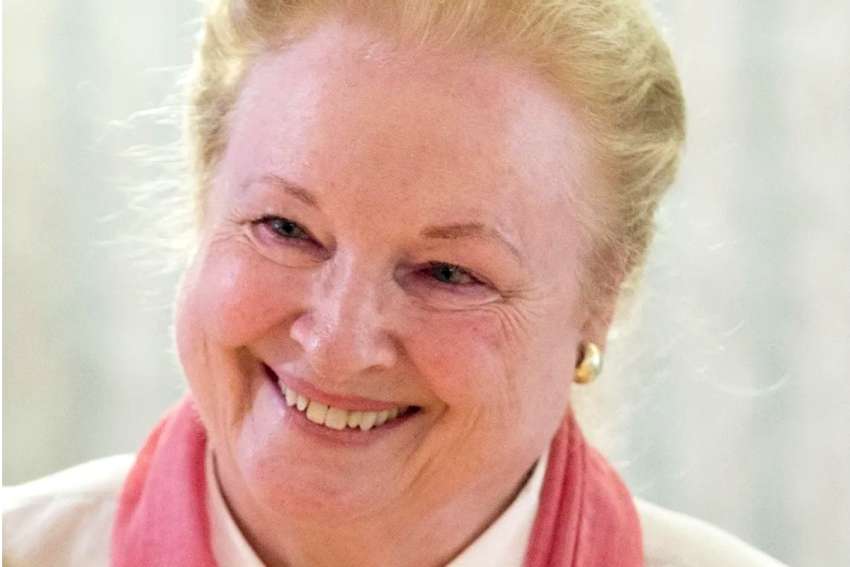When the former ambassador came face-to-face with the pontiff, Glendon recounts that he smiled and thanked her for her work. Glendon, jokingly responded in Italian, “a penance for my sins,” to which Pope Francis replied in kind, “we’ve all got a lot of those.”
This is just one of the stories Glendon serves up in her 2024 memoir In the Courts of Three Popes, a fascinating glimpse into the remarkable career of a woman who has arguably held more varied and influential roles at the Holy See than any other.
In the introduction, Glendon describes herself as having been a “stranger in a strange land,” a Connecticut Yankee knocked on the head and deposited in the court of King Arthur.
A layperson, woman, and proud American who values her citizenship in a constitutional republic, Glendon has nonetheless been called to serve the Church, what she calls “one of the world’s last absolute monarchies,” at the highest levels.
Glendon served as U.S. ambassador to the Holy See in 2008, but that year comprised only a fraction of her long and varied service.
Lawyer and legal scholar, Learned Hand Professor of Law, emerita, at Harvard University, was appointed to the Central Committee for the Great Jubilee 2000 in 1994, and as one of the 22 members of the newly created Pontifical Academy of Social Sciences (PASS). The following year Glendon was made a member of the Pontifical Council for the Laity.
That year, she received a phone call from Cardinal Law in which he delivered the unexpected news that the Pope John Paul II wanted her to lead the Holy See delegation to the UN’s Fourth World Conference on Women in Bejing.
Glendon is clear that his teaching about the role of women provided the philosophical undergirding for her work at the UN.
“As I worked on my opening statement for Bejing, I relied on a remarkable series of essays and talks in which Pope John Paul II meditated on women’s roles, repeatedly emphasizing that the Christian faith gives no room for oppression based on sex.”
Her deft and strong leadership at the UN laid the groundwork for further responsibilities. In 1997, she was an observer for the Synod for America, and in 2004 appointed as president of PASS.
Throughout the book, Glendon drops snippets which provide a personal glimpse into the lives of the popes. Glendon relates that St. John Paul II would tuck his napkin into his collar when eating and was once observed licking the knife after enjoying three morsels of cheese.
She also provides political anecdotes of more import. Though she was a shoo-in for the ambassadorial role, then Senator and Chair of the Senate Foreign Affairs Committee Joe Biden attempted to block her confirmation because she was while active on the various Holy See councils and committees, Glendon “had failed to register as a foreign agent.” It’s a felony charge but was clearly specious because of a specific exemption for “religious, scholastic, academic or scientific pursuits.”
Following her ambassadorship, Pope Francis appointed Glendon to a papal commission for ensuring transparency at the Vatican Bank. and For four years was on the board of superintendence overseeing the Institute of Religious Works (IOR). She was particularly influential in establishing the legal framework for the board.
The memoir is a pleasure to read. It reveals the work of a woman who throughout her 20 years of service at the Holy See provided enormous professional competence matched with a deep respect and love for the Church.
On January 1, 2025, five days before Sister Simona Brambilla entered the history books as the first woman appointed to head a dicastery of the Roman Curia, Charles Chaput, archbishop emeritus of Philadelphia, penned an article in First Things suggesting the Catholic Church has benefitted from “feminine genius” since Mary gave her “fiat.” Though Chaput used as examples four women more currently active than the now 86-year-old Glendon, he could easily be referring to the American legal scholar when he wrote:
“Today’s efforts to “de-masculinize” the Catholic Church, however well-intended, too often overlook the enormous contribution women already make to the life of the Church and the very real leadership and influence they already exercise.”


